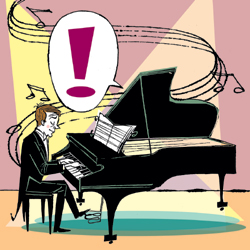SO THEY ASKED ME to perform for one of Seattle Weeklys Community Soapbox forums at Town Hall, thinking a little music would be nice among the speeches. Since I dont sing (talk about weapons of mass destruction), I was hit in the face with a problem: How can instrumental music—without lyrics—make any kind of direct political statement?
You need words to do this, as a million musicians from Kurt Weill to Bob Marley to Steve Earle well know. Composer Ned Rorem has spent his whole career pondering how to reconcile his art making with his pacifist philosophies. Hes set a lot of anti-war verse, most notably Whitmans in a song cycle called War Scenes, but trying to embody similar concepts in instrumental music has him stymied, too. As he put it, Military marches impel men into battle. What kind of music impels them to put down their weapons and walk away?
It rankles to have to depend on words at times like thisits like admitting my art is somehow inferior. In the end, at the Soapbox, I copped out and played Imagine on the piano. The lyrics werent stated, but everyone knew them; thats why the song has the impact it does.
But its not just lyrics — titles, too, taunt me with an associative power that music alone will never have. Recently I finished a new composition, a brief, quiet, somber page with some bitter clashes between viola and piano. I always have trouble with titles and finally settled as usual on a generic noncommittal one: Lento e fosco (slow and dark in the traditional Italian). But then a wave of cynicism struck: I realized I could very easily turn the piece into a statement and increase its impact just by crossing out that title and writing in Lament for the Children of Baghdad. I wouldn’t have to change a note. No one would be able to tell that I hadnt actually had the children of Baghdad in mind when I wrote the thing, and those six words alone would effortlessly manipulate the emotions of everyone who heard it.
Since I dont sing (talk about weapons of mass destruction), I was hit in the face with a problem: How can instrumental music—without lyrics—make any kind of direct political statement?
I suppose it wouldn’t work the same if you stuck that title in front of, say, Offenbachs Can-Can, but really, wouldnt any slow moody piece do just as well as any other? In fact, I wouldnt even have to use a title; I could simply tell people that that pieceany piecewas about whatever I said it was about, and (unless theyre as skeptical about these things as I am) theyd listen with that verbal description in mind. And if it literally doesnt matter what notes a composer writes downif all that matters is the words placed beside them, whether lyrics, titles, or liner notesthen the gesture is meaningless.
(The one example I’ll concede occurs when governments meddle in music making: When Stalin persecuted Shostakovich, or Hitler began to liquidate Jewish composers, then the very act of setting pen to paper made a political statement, for once without the help of wordsnothing more complex, perhaps, than Ive survived, powerful though that may be.)
Of course, the strength of music is that it leaps over words and directly affects the heart, head, and gut. It can be so much deeper and subtler than just a code for a verbal message, and its very nonspecificity is what makes it renewable and universal. But what good does that do composers today? We live in a society with one aesthetic value: relevancethe delusion that art should be about the consumer, when it cant help but be about its maker. (The arts flourishing today are those that are perfectly happy to play along with the delusion: television, Hollywood, mainstream pop.) Wordless, nonrepresentational music cant compete when marketable unambiguity is what everyone wants.
This is, at base, the reason classical musics lost ground in our culture: Not only does it not offer easy answersit doesnt offer any answers at all. Composers who want to participate in cultural dialogue either have to tacitly admit their impotence and turn to words in one form or another, or take the other tack and appeal only to the few people who prefer not to have everything spelled out. Theres nothing wrong with either decision, but its frustrating not to be able to contribute to the debate, and consequently to engage a broader audience, on our arts own terms.







